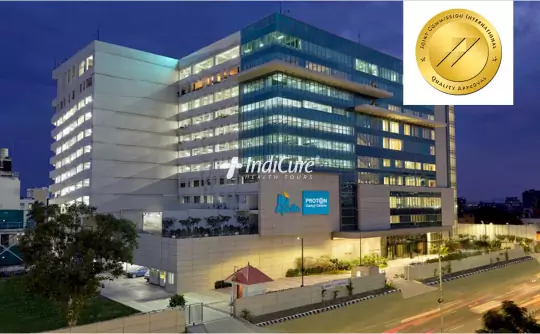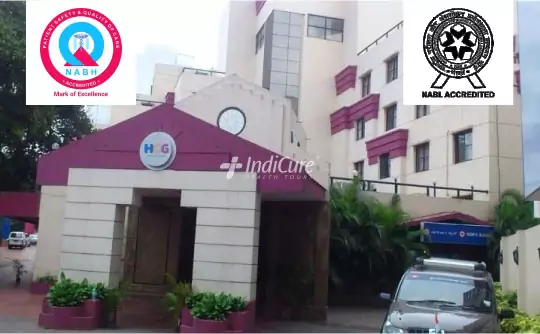

Oral Cancer Treatment Cost in India depends on the type of treatment required, your medical condition, hospital and the city where you choose to get the treatment done.
Typical Costs for Oral Cancer Treatment in India looks like:
| Procedure | Cost (Range in US $) |
|---|---|
| Investigations | 500-1,000 |
| Chemotherapy | 300-2,000 per cycle |
| Radiotherapy | 3,500-5,500 |
| Surgery | 2,000-3,000 |
Many times, the best option might include more than one type of treatment. Surgery, alone or with other treatments, is used to treat most uterine cancers. The cost associated with each type of treatment is different. IndiCure recommends you to understand the options by consulting our expert oncologists.
The overall oral cancer treatment cost depends on the number of chemotherapy or radiation therapy cycles that a patient has to undergo. In some patients, the doctors might advise giving more than a couple of cycles of chemotherapy or radiation therapy to kill the cancerous cells.
An important expense when it comes to your oral cancer treatment in India is going to be your oncologist's fees. IndiCure recommends highly experienced, skilled, board-certified surgeons who are capable of delivering successful surgeries. Although the charges may vary depending on the experience of the surgeon, you can be assured that you are in safe and skilled hands when you choose cancer treatment in India with IndiCure.
Having your treatment for oral cancer in an accredited surgical facility by skilled and qualified medical staff is a critical factor. Moreover, the geographical location of this facility in India also affects the quote. But, IndiCure provides you with a projected estimate that will be all inclusive and affordable.
The pre-surgical/treatment expenses are associated with the stage of the cancer and medical condition of the patient and thus the number and type of investigations and treatment required. Post-treatment expenses may include prescription medications and follow-up consultations.
We at IndiCure, understand that you travel with a budget in mind and do not like to be greeted by surprises after arrival in India. We thus club all these expenses and give you the package cost that is inclusive and affordable at the same time.
Your case manager shall give you an estimated cost of your surgery after discussing your medical reports with the surgeon. The final cost, however, shall be confirmed after your consultation with the surgeon.
In fact, we have Special Negotiated Rates with the Hospitals and you can avail Discounted Rates when you choose to Travel with IndiCure.


We Help you Choose the Right Treatment, Surgeon & Hospital

We Arrange Video/Telephonic Consultation with the Surgeon

We Assist you with Visa & Accommodation

We Receive you at the Airport and Drop you at Hotel/Hospital

We Assist you the at Hospital & Provide Post Operative Support

Chennai
The Apollo Proton Cancer Centre (APCC) is South Asia's and the Middle East's first and only proton therapy centre, as well as India's first JCI-accredited cancer hospital. The APCC includes a completely integrated treatment suite that provides the most advanced surgical, radiation, and medical procedures available. The Centre brings together a remarkable team of clinicians renowned globally in cancer care, in keeping with the Apollo Pillars of Expertise and Excellence.

Bangalore
HCG- HealthCare Global Enterprises Ltd, is the specialized chain of hospitals in cancer care headquartered in Bangalore. Founded by Dr. Ajaikumar, a renowned medical and radiation oncologist with 40 years of experience, HCG has 26 centres across India with its largest facility in Bangalore.
HCG Hospital Bangalore is not only the most advanced facility for cancer care in India, it is a Centre of Excellence for most advanced cancer care and research.
Oral cancer is a type of cancer that develops in the mouth or throat tissues. It's part of a bigger category of tumors known as head and neck cancers. The majority form in the squamous cells of your mouth, tongue, and lips.
Oral cancer affects more than 49,000 people in the United States each year, with the majority of instances happening in persons over the age of 40. Oral cancer is usually found after it has spread to the lymph nodes in the neck.
Oral cancer usually affects persons in their sixties and seventies. Your lips and the earliest parts of your tongue, as well as the roof and floor of your mouth, are all affected by oral cancer. It also affects your oropharynx, which includes the last section of your tongue and the roof of your mouth, as well as your tonsils, sides, and back of your throat.
Oral cancer, often known as mouth cancer, is a type of cancer that affects the inside of the mouth. Oral cancer can resemble a common condition with your lips or mouth, such as white spots or bleeding sores.
The difference between a common condition and cancer is that these changes are permanent. Oral cancer can spread from your mouth and throat to other parts of your head and neck if left untreated.
Mouth cancers develop when the DNA of cells on the lips or in the mouth undergoes mutations. The DNA of a cell includes the instructions that tell it what to do. When healthy cells would perish, the genetic alterations tell the cells to keep growing and dividing. A tumor can occur when abnormal mouth cancer cells congregate. They may spread from inside the mouth to other sections of the head and neck, as well as other parts of the body, over time
Factors that can increase your risk of mouth cancer include:
There is no definite way to avoid mouth cancer. You can, however, lower your chance of mouth cancer if you:
The majority of patients with mouth cancer are treated with surgery. Most of these tumors can be removed through the mouth, but others may require a more invasive procedure. The size, stage, and location of the tumor all influence which surgery is best for the patient.
One of the operations described below may be used to remove the tumor, depending on its location and size:
If you are suffering from any of the above mentioned symptoms, you should see a doctor immediately who would advise tests to confirm the diagnosis. If you are diagnosed with oral cancer, you need to start the treatment immediately.
We at IndiCure completely understand your concerns and it is always our endeavor to provide the best outcome for every patient. Following is the list of questions you must ask before you embark on your journey for oral cancer surgery in India.
Prepare to answer questions about your:

The main (primary) tumor is removed using a technique that is determined by the size and location of the tumor. If a tumor is located in the front of the mouth, for example, it may be quite simple to remove it through the mouth. However, a larger tumor (especially one that has spread into the oropharynx) may require a neck incision or a special saw to cut through the jaw bone to reach the tumor. (This procedure is known as a mandibulotomy.)
The outcome of the surgery you choose is determined by the stage of your mouth cancer. There is a good likelihood of total recovery if the cancer is detected early.
You may need to stay in the hospital for a few days after surgery. The length of your hospital stay is determined by how much and what section of your oral cavity was removed. After oral cancer surgery, most people are able to return home within a few days.
Cancer of the mouth is known as oral cancer. Oral cancer, like most cancers, is more likely to be treated if it is detected and treated early. Approximately one-third of persons who are treated for oral cancer go on to acquire a new cancer. If you've had oral cancer treatment, talk to your doctor about scheduling follow-up exams.
Oral cancer can be successfully treated in some people by removing the tumor from their lip or mouth. Someone whose oral cancer has spread, on the other hand, will have undergone a separate and more invasive procedure, which may include reconstructing a portion of their mouth or jaw.
Regardless of your situation, you may need to see your healthcare providers, including your dentist, on a regular basis.
Any time you observe changes in your mouth, such as new chronic sores or rough places that don't go away after two weeks, you should contact your healthcare professional.
Early detection of oral cancer can lower the likelihood of the cancer spreading or growing. A monthly self-examination can help you spot mouth cancer early. Contact your dentist right away if you notice any changes or something strange.
Oral cancer can be avoided, and you can play a part in that prevention. The following suggestions can aid in the prevention of mouth cancer:
It is usually the dentists that are first to detect any signs of oral cancer. So, we always advise you to get your dental/oral check done regularly.
Preliminary tests may be ordered or you may be referred to an oral and maxillofacial surgeon or a head and neck surgeon. Ear, nose, and throat (ENT) specialists are another name for these professionals.
Tests for oral cancer include:
Physical exam: Your healthcare practitioner will examine the inside of your mouth as well as the area around it. They'll also look for indicators of pre-cancer or malignancy in your head, face, and neck.
Brush biopsy: also known as scrape biopsy or exfoliative cytology is done to gather cells to be evaluated for malignancy.
Incisional biopsy: Your healthcare professional will remove small amounts of tissue in order to obtain cells for cancer testing.
Indirect laryngoscopy and pharyngoscopy: Your healthcare professional examines your throat, the base of your tongue, and a portion of your larynx with a small mirror on a long thin handle (voice box).
Direct (flexible) pharyngoscopy and laryngoscopy: An endoscope may be used to examine parts of your throat and mouth that aren't visible with mirrors.
No, it is not necessary to always have surgery for treating oral cancer. Radiation alone can be employed as a first line of treatment in some cases. Large or deep malignancies frequently necessitate surgery.
The five-year survival statistics for oral cavity and pharyngeal malignancies, according to the National Cancer InstituteTrusted Source, are as follows:
60 percent of the time all patients with oral cancer will live for five years or longer. The earlier a patient is diagnosed, the better his or her chances of surviving after therapy. In reality, people with stage 1 and 2 oral malignancies have a five-year overall survival rate of 70 to 90%. This emphasizes the need of early detection and treatment.
Make your medical trip to India even more comfortable and complete with our range of additional services, designed to take care of all your needs beyond the hospital.
Traveling abroad for medical reasons can be challenging if you are alone, but with IndiCure by your side, it doesn't have to be. With over fifteen years of experience and an exclusively curated network of India's best surgeons and top hospitals, we make your medical tour to India easier and safer. We will guide you at every step, handling all the end-to-end arrangements for your surgery, travel, and stay.
Ramandeep Dhaliwal
a month ago
I had great experience having rhinoplasty through Indicure. Dr. Ruchika from Indicure has helped me in finding best plastic surgeon, answering all my questions...
Ramandeep Dhaliwal's Full Review
Joshua Archer
3 months ago
My name is Joshua Archer I'm from New Zealand, bay of plenty, kawerau I opted for the bypass surgery in January 2023 but planned it in advance for 28 September found IndiCure...
Joshua Archer's Full Review
Kera Ren
8 months ago
Absolutely loved my experience with IndiCure - from first inquiring to meeting the surgeon pre op to my follow up post op. The surgeon was extremely approachable...
Kera Ren's Full Review
Andreana Paul
5 months ago
Had a wonderful experience. Visited India for my plastic surgery. From sending mails, airport pickup, comfortable accommodation and, to smooth hospital appointment booking...
Andreana Paul's Full Review
Brandi Luce
5 months ago
I had the privilege of using Indicure's services for a cosmetic procedure that I had wanted for a long time but had always been apprehensive about. Ruchika helped me...
Brandi Luce's Full Review
Jade M
3 years ago
Indicure Health Tours went above and beyond my expectations. They helped me with every aspect of my journey and were professional, kind and caring. I was...
Jade M's Full Review
The content on the website (www.indicure.com) is intended to be general information and is provided only as a service. All photographs on our website of before and after results are examples only, and do not constitute an implied or any other kind of certainty for the result of surgery.
Learn about IndiCure Health Tours' comprehensive editorial policy that strives to deliver trustworthy, helpful, relevant, accurate and people-first content on medical tourism in India.
It is not medical advice and should not be taken as medical advice. It should not be used to diagnose or treat a health condition and is in no way meant to be a substitute for professional medical care. You are advised to see a surgeon in person to assess what surgery may or may not accomplish for you.
It is also important to keep your expectations realistic and to understand that all surgical procedures carry risks and should never be taken lightly.